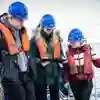



Sea levels are rising. Icebergs are melting. Species are facing extinction. Now more than ever, we need to protect our precious marine resources. That’s where you come in…
You’ll be studying at the centre of one of the UK’s most important aquatic habitats with the North Sea, internationally recognised research facilities – including The Deep – and the rest of the Yorkshire Nature Triangle on your doorstep.
Plus, this course is accredited by The Institution of Environmental Sciences (IES) so you’ll have a pathway to become a Chartered Environmentalist or Chartered Scientist when you graduate.
About this course
Study life beneath the waves on this exciting, accredited course that includes optional, subsidised scuba dive training.2
During your first two years with us, you’ll complete a broad and varied programme to give you a thorough foundation in essential marine biology studies. You’ll learn all aspects of the marine environment, from the diversity of marine organisms to the impact of ocean acidification and climate change.
In year three, you’ll then have the chance to specialise in the areas you’re most interested in and get involved in research that’s making a difference to our world and the people on it.
We’re constantly reviewing our optional modules – so everything you learn reflects the cutting edge of the subject and the latest research by our award-winning staff – and you’ll have plenty of opportunities to get hands-on.
Our field trips here are exceptional – both at home and overseas. Recently, our students got the chance to work in far-flung places like Brazil and Egypt.
On top of this, we offer part-funded PADI advanced scuba dive training as part of your degree.
Start a field trip that never ends
Module options
Each year, you’ll study modules worth a certain number of credits, and you need 120 credits per year. Most modules are 20 credits – so you’ll study six modules each year. Some longer modules, such as a dissertation, are worth more. In these cases, you’ll study fewer modules - but the number of credits will always add up to 120. Some modules are compulsory, some are optional, so you can build a course that’s right for you.
Filters
Adaptation to the Marine Environment
Life in the ocean is complex and varied, with a bewildering diversity of organisms adapted for life in an ever-changing realm from the deepest trenches to the intertidal zone. Over time, organisms have evolved a range of mechanisms for coping with these conditions, adapting to life in the deepest oceans, rapidly changing intertidal areas and heavily exploited shallow seas. Here we explore how organisms have adapted to key environmental factors and consider how they will cope with future challenges under a climate change scenario
compulsory
20 credits
Diversity of Life
Through practical workshops, this module introduces you to the diversity of life and the fascinating adaptations that enable organisms to inhabit nearly all conceivable ecological niches.
compulsory
20 credits
Marine Biology: An Introduction
From space, the planet is blue. Marine life has evolved into a myriad of forms living in some of the most extreme habitats on the planet; from great depths to battered coasts. This introduction to marine biology explores the marine environment, the diversity of life within it and how to conserve it.
compulsory
20 credits
Evolution
Why did sex evolve? Why do we die? What is a species? How can evolutionary medicine help us? This module will provide you with an understanding of how life on earth came to be what it is, from genes to species. Without evolution, nothing in biology makes sense.
compulsory
20 credits
Environmental Problems and Solutions
Discover the fundamental principles of environmental systems and the interconnectedness of humankind with the environment.
compulsory
20 credits
Ecology (with optional Dive Training)
Ecology is the study of interactions among living organisms and their environment, and is the basis for nature conservation and understanding human impact on the planet. Gain an understanding of ecological theory, applied ecology, and the collection and analysis of ecological data. You can choose to complete integrated PADI Advanced Open Water training, with an opportunity to develop specialist diving skills relevant to ecological science.
compulsory
20 credits
Geographical Information Systems
Develop your understanding of the principles and processes behind GIS, the nature and use of spatial data and the application of GIS on this practical module.
compulsory
20 credits
Coastal Seas
How to be a proper marine biologist! Here we explore the coastal and shallow sea environment during a 7-day residential field course (or equivalent) - living, eating and drinking marine biology.
You will learn how to collect robust data from the marine environment, undertake your own project and develop your identifications skills. We focus on hands-on learning to understand some of the key concepts and challenges of marine biology and develop some of the essential skills needed for a job in the field.
compulsory
20 credits
Oceanography
Study physical and chemical oceanography and marine ecosystems such as tropical marine systems, deep sea and hydrothermal vents.
compulsory
20 credits
Our facilities


Watchlist
Dr Nicky Dobson
Course overview
2 mins
Marine Biology field trip
Course Highlight
1 min
Hannah Lightley
Course Highlight
2 mins
Featured academics
You learn from the best: a small, friendly department that does world-leading research.
In fact, Hull is the only university in the world to have three winners in the Royal Society of Biology’s Higher Education Bioscience Teacher of the Year Awards.

Professor Rodney Forster
Professor
Rodney is a Fellow of the Royal Society for Biology and a current member of the Defra Ocean Processes Evidence Group. His teaching and research interests include intertidal ecology, ocean colour, underwater optics and primary production.

Dr Sue Hull
Senior Lecturer in Marine Biology and Ecology / Programme Director, Marine Biology
Sue is an intertidal marine ecologist and programme director for Marine Biology at Hull. She jointly won the CIRIA Award for Innovation in 2019 for her work on sea defences and is part of a research cluster looking at birds in the Humber Estuary.
Entry Requirements
What do I need?
This course is currently available through Clearing, which means our entry requirements are a bit different to what they would normally be.
At Hull, you're a name not a number. During Clearing, we look at all of your qualifications and experience, not just your academic grades. We may be able to offer you a place whatever your situation. Get started by completing our eligibility checker, and find out immediately if you could study at the University of Hull.
Have questions? Our admissions team will be happy to help.
Fees & Funding
How much is it?

Future prospects
The field and lab skills you'll learn will open up a wide range of careers, such as being a scientific officer with organisations such as the Environment Agency, local councils or fisheries agencies.
Many of our graduates pursue careers in environmental consultancy or if you’re more focused on conservation, you can pursue a career with a wildlife trust or conservation organisation.
There’s also the option to move on to postgraduate study. Like our MSc in Environmental Change Management and Monitoring, a PhD, research Masters or teacher training.
Become part of the next generation of futuremakers
Like what you’ve seen? Then it’s time to apply.
The standard way to apply is through UCAS. This will give you the chance to showcase your skills, qualities and passion for the subject, as well as providing us with your academic qualifications.
Not ready to apply yet?
Visit our next Open Day, and see all that the University of Hull has to offer. Talk to our lecturers about your subject, find out what university is really like from our current students, and take a tour of our beautiful campus and amazing facilities.
You may also be interested in...
Our friendly, supportive lecturers include winners of the Royal Society of Biology’s 'Higher Education Bioscience Teacher of the Year Award'.
Choose subsidised dive training as part of our Ecology module and become a PADI-certified Advanced Open Water Diver (extra fee may be payable).
Marine Biology: Ranked 9th in the UK for assessment and feedback. National Student Survey (NSS) 2025, HEIs only.
Biology is ranked joint 3rd in the UK for Value Added Score. The Guardian University Rankings 2026.
All modules on this course page are subject to availability and this list may change at any time.
